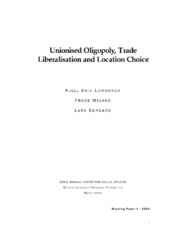| dc.contributor.author | Lommerud, Kjell Erik | eng |
| dc.contributor.author | Meland, Frode | eng |
| dc.contributor.author | Sørgard, Lars | eng |
| dc.date.accessioned | 2006-06-21T15:22:09Z | |
| dc.date.accessioned | 2020-12-10T06:32:23Z | |
| dc.date.available | 2006-06-21T15:22:09Z | |
| dc.date.available | 2020-12-10T06:32:23Z | |
| dc.date.issued | 2003-03 | eng |
| dc.identifier.issn | 1503-0946 | |
| dc.identifier.uri | https://hdl.handle.net/1956/1403 | |
| dc.description.abstract | In a two-country reciprocal dumping model, with one country unionized, we analyze how wage setting and firm location are influenced by trade liberalization. We show that trade liberalization can induce FDI, which is at odds with conventional theoretical wisdom and cannot happen in a corresponding model without unionization. FDI is undertaken partly to win a distributional battle with unionized labor, and the incentives to invest abroad can be too large seen from a welfare point of view. | en_US |
| dc.format.extent | 331230 bytes | eng |
| dc.format.mimetype | application/pdf | eng |
| dc.language.iso | eng | eng |
| dc.publisher | Stein Rokkan Centre for Social Studies | eng |
| dc.relation.ispartofseries | 3-2003 | |
| dc.relation.ispartofseries | Working Paper | en |
| dc.title | Unionised Oligopoly, Trade Liberalisation and Location Choice | eng |
| dc.type | Working paper | eng |
| dc.subject.nsi | VDP::Samfunnsvitenskap: 200 | nob |
